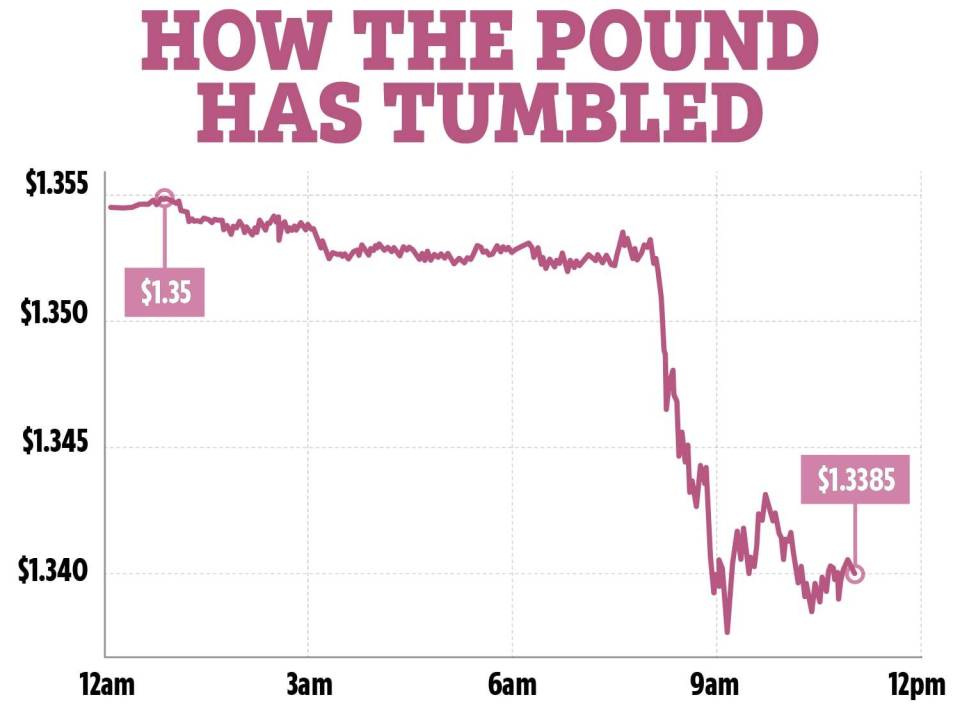STERLING has tumbled sharply today, sliding over 1% against the US dollar to $1.33 and 0.7% against the euro to €0.8698.
This marks its worst performance among G10 currencies and highlights growing unease among investors about the UK’s economic stability, as government borrowing costs soar to levels not seen since 1998.
The drop in the pound’s value is closely linked to rising yields on government bonds, known as gilts.
When the government needs funds, it issues bonds.
These bonds come with interest rates, referred to as yields, which represent the return investors will earn.
Right now, these yields are climbing, making borrowing increasingly expensive for the government.
The yield on 30-year gilts has reached 5.69%, the highest level in almost 30 years, while 10-year gilts have risen to 4.79%.
Typically, higher yields should make these bonds more appealing to investors.
To purchase bonds, investors would need pounds, which would usually strengthen the pound’s value.
However, this isn’t happening.
Instead of boosting confidence, the rising yields are raising concerns among investors about the UK’s economic stability.
They worry the government may be facing financial difficulties and fear the UK could be heading towards “stagflation” – a troubling mix of slow economic growth and high inflation.
These fears are making the UK a less attractive place to invest.
As a result, investors are selling pounds rather than buying them, causing the pound’s value to fall further.
This week’s selloff in gilts reflects a broader trend in global bond markets, where debt levels are under scrutiny.
However, the UK’s problems seem especially serious.
Investors worry the Labour Government may struggle to balance the books as Chancellor Rachel Reeves prepares to deliver the autumn budget.
The Chancellor faces the daunting task of addressing a £51billion hole in public finances, with speculation mounting that tax hikes and spending cuts may be on the horizon.
The rising cost of borrowing only compounds these difficulties, as servicing existing debt becomes more expensive.
Prime Minister Sir Keir Starmer has also reshuffled his team in a bid to bolster his government’s credibility ahead of a tough end to the year.
Darren Jones, formerly Reeves’ deputy in the Treasury, has been promoted to chief secretary to the Treasury, while James Murray steps into his previous role.
Despite the shake-up, Neil Wilson, UK investor strategist at Saxo Markets, said: “The market move was a sign that investors do not have confidence the Treasury will stick to its strict borrowing rules.
“30-year yields at their highest in almost three decades is not a good look for the Labour government, and underscores that there is little fiscal or economic credibility left.”
Shadow Chancellor, Sir Mel Stride added: “The pound suffering its worst day in nearly three months.
“It’s yet another economic disaster from Rachel Reeves – and a clear vote of no confidence in Labour from the markets.
“This is what happens when you have a government with next to no business experience.
“Labour promised stability but they’ve doubled inflation, delivered soaring debt and destroyed business confidence.
“With more tax rises on the horizon, the economy is now in a precarious position.”
Economists are warning that Chancellor Rachel Reeves will need to raise taxes or cut government spending to meet fiscal targets.
Rising interest payments on government debt is shrinking the government’s available funds.
Reeves is reportedly considering broader tax changes to address the issue.
One proposal under review is applying National Insurance to rental income, which critics argue could lead to higher costs for tenants.
There is also talk of replacing stamp duty with an annual property tax on homes worth over £500,000, sparking debate.
Capital gains tax on properties valued above £1.5million is another option being explored.
Plus, pension tax relief is being examined, with the possibility of introducing a flat rate.
This could reduce benefits for higher earners but generate billions in revenue each year.
Reeves is expected to make economic growth the centrepiece of her next Budget, warning that Britain’s economy is “stuck” and in need of bold solutions.
Headache over borrowing won’t go away…
Analysis by Ryan Sabey, The Sun’s Deputy Political Editor:
Rachel Reeves has been plagued by the state of the public finances – now she has a headache over borrowing that won’t go away.
The Chancellor – watching on from the Treasury – can see the money markets lose faith bit by bit in the government’s plan to fix the public finances.
For the last week or so, she has been hit by news from the City that borrowing costs have reached their highest figures since the late 1990s.
Today the 30-year borrowing costs rose to as high as 5.70%, which is the rate investors demand for funding its debt.
City experts say the jump in the last 24 hours points to there being dwindling faith in the government’s ability to keep control of the public finances, and caught up in sticky issues such as stubborn inflation.
There has also been a sharp fall in the pound following the shake-up of Sir Keir Starmer’s top team, with more economic heft brought into the heart of Number 10.
The Budget, which is expected to be held in November, will now be a test for Chancellor and the PM to show they have a plan to deal with the country’s huge debt problems.
The wrong signals have been sent out in recent months from the government as they tried to cut costs – turning their backs on major welfare reforms and partial retreat on winter fuel payments.
Without tackling this issue head-on, those long term borrowing costs are only going in one direction.
What does this mean for my money?
A fall in the value of sterling is bad news for holidaymakers, who will find they get less travel money at the Foreign Exchange.
If the value of the pound versus the dollar is $1.35/£1 then for every £100 you change up, you get £135 dollars.
If the pound to dollar exchange rate drops to $1.33/£1 then you’ll only get $133 for £100 holiday spending money.
That means buying anything abroad seems more expensive and can impact what you can afford to do on your holiday.
You can take some steps to make your travel money go further.
Ordering your cash online in advance will help avoid a last-minute rush at the airport, where the exchange rates are typically much worse.
TravelMoneyMax at moneysavingexpert.com can help you compare rates from different bureaux de change.
Overseas spending cards mean you don’t have to worry about carrying wads of cash, too.
A weaker pound can also impact the value of your pension or any investments you might have.
This is because if you hold shares in a company based overseas, their value is affected by currency movements.
If you notice a dip in the value of your investments, it’s best not to panic or be tempted to sell.
What are gilts?
GOVERNMENT bonds, or gilts, are seen as the telltale sign of global investors’ opinion on the health of the UK economy and its leadership.
They also shape investors’ views on whether a Budget has been a success or failure.
Gilts are issued by the Government as parcels of debt that pay out a return — or coupon — to investors over a fixed term, such as five, 10 or 30 years.
The yield reflects the amount of interest paid, and increases when the price of a bond falls to reward the investor for the risk of holding a cheaper asset.
Yields increase when the price of a bond falls because investors want bigger returns for owning a riskier asset.













